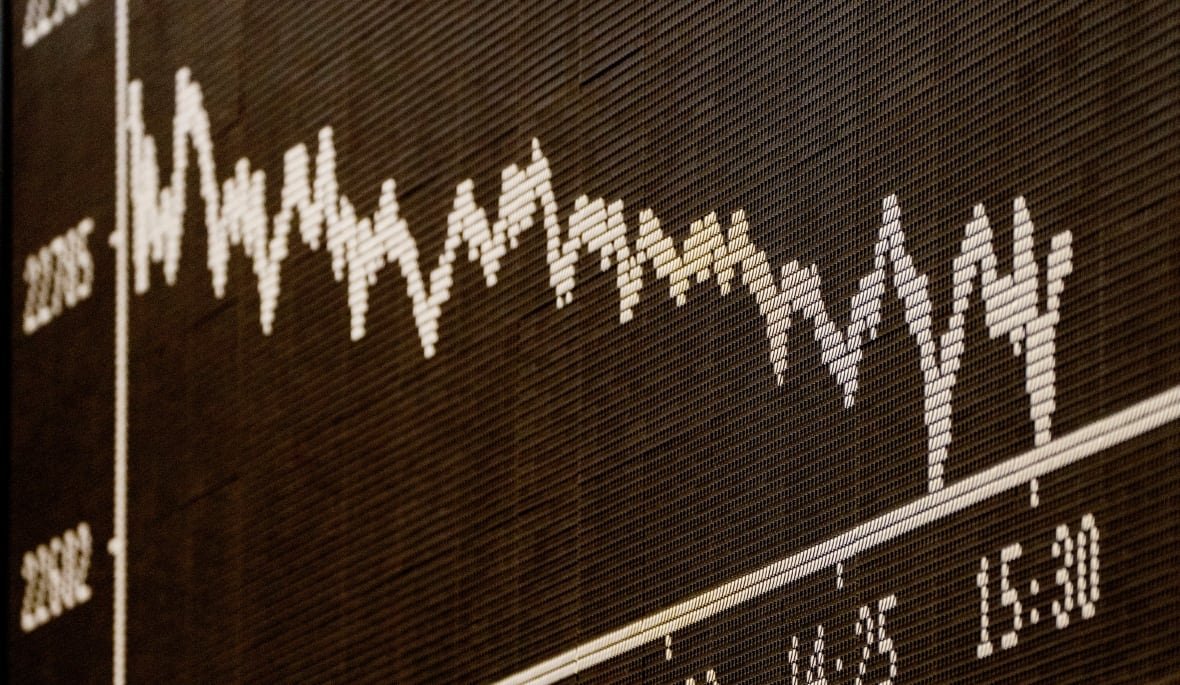Stocks tumbled in morning trading on Wall Street on Tuesday as a trade war between the U.S. and its key trading partners escalated, but uncertainty around the tariffs’ duration has made the impact on global markets scattered.
The tariffs between the United States, Canada, Mexico and China have helped to extend a recent slump for U.S. stocks that was prompted by signs of weakness in the economy.
The S&P 500 fell one per cent, weighed down by nearly every sector except the relatively safer investments of real estate and utilities.
Canada’s main stock index dropped nearly 500 points in early trading, and the Dow Jones industrial average, one of the biggest indicators of the health of the U.S. economy, shed 572 points, or 1.3 per cent, as of 12:48 p.m. ET. The Nasdaq composite fell 0.3 per cent, meaning that the tech-heavy index is approaching a 10 per cent decline from its most recent closing high, which is what the market considers a correction.
Markets in Europe fell sharply, while stocks in Asia saw more modest declines.
The drops follow a steep sell-off on Monday. Altogether, the decline has wiped out all of the markets’ gains since U.S. President Donald Trump’s election in November — gains that were built largely on hopes for policies from Trump that would strengthen the U.S. economy. Worries about tariffs raising consumer prices and reigniting inflation have been weighing on both the economy and Wall Street.
Imports from Canada and Mexico are now to be taxed at 25 per cent, with Canadian energy products subject to 10 per cent import duties. The 10 per cent tariff that Trump placed on Chinese imports in February was doubled to 20 per cent.
Retaliations were swift.
Canada has already slapped tariffs on $30 billion worth of American goods, and has promised to introduce tariffs on $125 billion more in three weeks’ time. Prime Minister Justin Trudeau, citing a Wall Street Journal editorial, called Trump’s targeting of Canada a “very dumb” move, adding that more non-tariff measures are coming if Trump doesn’t back down.
China responded to new U.S. tariffs by announcing it will impose additional tariffs of up to 15 per cent on imports of key U.S. farm products, including chicken, pork, soy and beef, and expanded controls on doing business with key U.S. companies. Mexico is also planning tariffs on goods imported from the U.S.
Dollar rattled
The U.S. dollar index hit its lowest level since Dec. 6, 2024, on Tuesday morning, as concerns about the tariffs’ impact on the broader U.S. economy outweighed expected boosts from the move.
“We’ve seen the dollar weakened, but I think this reflects markets’ assumptions about how the tariffs will have a negative impact, not just on external growth, but how it could potentially have a negative impact on U.S. growth,” Brian Daingerfield, foreign exchange strategist at Natwest Markets in New York, told Reuters.
After hitting a one-month low late Monday following Trump’s confirmation of the tariffs, the Canadian dollar slightly strengthened overnight, while investors fled to traditional safe-haven currencies like the Japanese yen and Swiss franc.
Analysts said many in the market were hoping tariffs might quickly be lifted if deals can be struck.
“The price action suggests that market participants remain hopeful that the tariff hikes won’t remain in place for long helping to limit trade and economic disruption,” said Lee Hardman, senior currency analyst at Japanese bank MUFG.
Market reaction muddled amid uncertainty
The uncertainty surrounding the trade war — with experts unclear on how long tariffs and countermeasures could last — is one of the reasons the initial market response appeared muted, according to one expert.
“What we don’t know is duration, and that’s key,” Derek Holt, vice-president and head of Capital Markets Economics at Scotiabank, stated in a note to clients. He added that Trump can be a volatile figure in terms of his decision-making, so it’s unclear how dedicated he is to maintaining the tariffs.

“If they do last, then the effects on the [North American] economy and markets will be much larger. That might not take long, given guidance from the auto sector that shift cancellations and plant closures could begin within roughly a week after arriving.”
Holt said the retaliatory measures put in place by Canada, Mexico and China have not been as extreme, at this stage, as what the U.S. has enacted, limiting some of the damage to markets.
While Canada is matching the 25 per cent tariffs, the counter-measures target a smaller volume of U.S. imports. China’s tariffs on U.S. goods won’t go into effect until March 10, and Mexico will not be announcing which U.S. products its counter-measures will target until Sunday.
But markets are continuing to fluctuate as the reality of the tariffs sinks in — and we haven’t seen the full impacts yet, analysts say.
“Markets are getting crushed today,” Colin Cieszynski, portfolio manager and chief market strategist at SIA Wealth Management, told The Canadian Press.
“It’s not just Canada; it’s U.S. markets are getting hammered, European markets are getting hammered, even the Asia Pacific markets were down.”
If tariffs remain in place for a year, Canada would “face the risk of a moderate recession,” according to Douglas Porter, chief economist at the Bank of Montreal.
“With little confidence given the lack of historical precedent, we estimate that the tariffs will reduce real GDP growth by roughly 1.5 ppts to around 0.5 per cent in 2025,” he wrote in a note to clients, adding that this reflects the anticipated decrease in demand for Canadian goods from U.S. customers, which accounts for about a fifth of Canada’s GDP.
Retailers, companies on alert
The tariffs are prompting warnings from retailers, including Target and Best Buy, as they report their latest financial results. Target slumped 4.6 per cent despite beating Wall Street’s earnings forecasts, reporting that there will be “meaningful pressure” on its profits to start the year because of tariffs and other costs.
Best Buy plunged 14.1 per cent after giving investors a weaker-than-expected earnings forecast and warning about tariff impacts.
Automakers, one of the industries expected to be hit worst in the trade war, were already reporting losses on Tuesday. Ford and General Motors, which have vast supply chains across North America, fell three per cent and 3.6 per cent, respectively.
Alliance for Automative Innovation, a trade group representing nearly all major automakers in the U.S., warned on Tuesday that the trade war will lead to drastic price hikes, with some vehicle models anticipated to increase as much as 25 per cent.
U.S. President Donald Trump’s 25 per cent tariff on Canadian goods are expected to start on March 4. The National’s Adrienne Arsenault asks journalists and a business professor to answer viewer questions about how the tariffs will impact prices, a possible recession and Canadian diplomacy.
At the consumer level in Canada, some impacts were immediate. The Liquor Control Board of Ontario, which sells liquor products to the public, closed its website Tuesday while it removed U.S. products from the shelves in response to the tariffs.
The alcohol giant sells about $1 billion per year in U.S. products, Ontario premier Doug Ford said Tuesday.
Business owners in Canada are watching the news with dismay. Steve Himel, president of Henderson Brewing Company, told CBC News Network that the company is already having to make changes to its yearly business plan.
“We will start experiencing this pain within days or weeks. But the uncertainty of this is something we are feeling right this minute,” he said. “Is this going to last a week or a month? We don’t know.”

